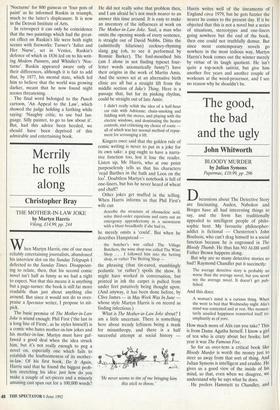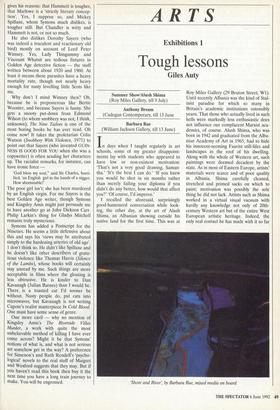The good, the bad and the ugly
John Whitworth
BLOODY MURDER by Julian Symons Papermac, £10.99, pp .296 Discussions about The Detective Story arc fascinating. Auden, Nabokov and Borges have all had interesting things to say, and the form has traditionally appealed to intelligent people of philo- sophic bent. My favourite philosopher- addict is fictional — Chesterton's John Boulnois, who can't drag himself to a social function because he is engrossed in The Bloody Thumb. He thus has NO ALIBI until Father Brown happens along.
But why are so many detective stories so bad? Raymond Chandler put it succinctly:
The average detective story is probably no worse than the average novel, but you never see the average novel. It doesn't get pub- lished.
And this does:
A woman's mind is a curious thing. When she went to bed that Wednesday night Alix's mind was contented and at rest. Her momen- tarily assailed happiness reasserted itself tri- umphantly as of yore.
How much more of Alix can you take? This is from Dame Agatha herself. I know a girl of ten who is crazy about her books; last year it was The Famous Five.
So for us over-tens a critical book like Bloody Murder is worth the money just to steer us away from that sort of thing. And Julian Symons is intelligent and erudite. He gives us a good view of the inside of his mind, so that, even when we disagree, we understand why he says what he does.
He prefers Hammett to Chandler, and gives his reasons: that Hammett is tougher, that Marlowe is a 'strictly literary concep- tion'. Yes, I suppose so, and Mickey Spillane, whom Symons much dislikes, is tougher still. But Chandler is witty and Hammett is not, or not so much.
He also dislikes Dorothy Sayers (who was indeed a truculent and reactionary old bird) mostly on account of Lord Peter Wimsey. Yes, Lady Thingummy and Viscount Whatsit are tedious fixtures in Golden Age detective fiction — the stuff written between about 1920 and 1960. At least it means these parasites have a heavy mortality rate, though not nearly heavy enough for nasty levelling little Scots like me.
Why don't I mind Wimsey then? Oh, because he is preposterous like Bertie Wooster, and because Sayers is funny. She gets a snooty put-down from Edmund Wilson (to whom snobbery was not, I think, unknown); The Nine Tailors is one of the most boring books he has ever read. Oh come now! It takes the proletarian Colin Watson (Snobbery With Violence, 1971) to point out that Sayers (who invented GUIN- NESS IS GOOD FOR YOU when she was a copywriter) is often sending her characters up. The racialist remarks, for instance, can have ironic force -
'God bless my soul," said Sir Charles, horri- fied, 'an English girl in the hands of a nigger. How abominable!'
The poor girl isn't; she has been murdered by an English virgin. For me Sayers is the best Golden Age writer, though Symons and Kingsley Amis might just persuade me to have another go at John Dickson Carr. Philip Larkin's thing for Gladys Mitchell remains truly mysterious.
Symons has added a Postscript for the Nineties. He seems a little defensive about this and says his 'views may be attributed simply to the hardening arteries of old age'. 1 don't think so. He didn't like Spillane and he doesn't like other describers of gratu- itous violence like Thomas Harris (Silence of the Lambs), whose books will certainly stay unread by me. Such things are more acceptable in films where the gloating is less obtrusive. He is kinder to Dan Kavanagh (Julian Barnes) than I would be. There , is a toasted cat I'd sooner be without. Nasty people do, put cats into microwaves, but Kavanagh is not writing Capote's realist masterpiece In Cold Blood. One must have some sense of genre.
One more cavil — why no mention of Kingsley Amis's The Riverside Villas Murder, a work with quite the most unbelievable method of killing I have ever come across? Might it be that Symons'
notions of what is, and what is not serious art somehow get in the way? A preference for Simenon's and Ruth Rendell's 'psycho-
logical' novels to the real stuff of Maigret and Wexford suggests that they may. But if
you haven't read this book then buy it the next time you have a long train journey to make. You will be engrossed.



































































 Previous page
Previous page